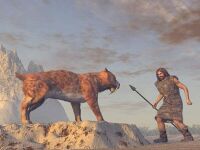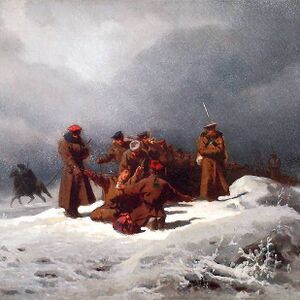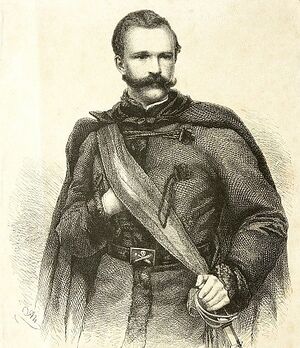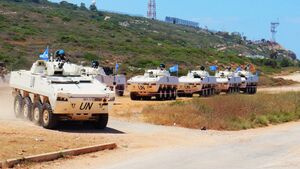Sprotavia
This article is incomplete because it is pending further input from participants, or it is a work-in-progress by one author. Please comment on this article's talk page to share your input, comments and questions. Note: To contribute to this article, you may need to seek help from the author(s) of this page. |
Sprotavian Republic | |
|---|---|
|
Flag | |
| Motto: "Freedom, Honor, Homeland" | |
| Anthem: "Partisan Spirit" | |
| Capital and largest city | Lyakvia |
| Official languages | Sprotavian |
| Ethnic groups |
|
| Demonym(s) | Sprotavian |
| Government | Guided Democracy |
• Marshal of Sprotavia | Konstanty Sosnowski |
• Prime Minister | Taras Naumenko |
| Legislature | Parliment |
| Senat | |
| Sejm | |
| Establishment | |
• Proclamation of Sprotavian Republic | 25 August 1807 |
| Population | |
• Estimate | 24 362 769 |
| Currency | Szostak (SVS) |
Sprotavia, formally Sprotavian Republic is an authoritarian state situated in Northern Nortua in the Coalition of Crown Albatross. Sprotavia has estimated population of 24 000 000, one of the largest in Nortua. Lyakvia is the nation's capital and the largest metropolis. Other major cities include Bliskobrzeg, Polavle, Koz, Caunas, Sterliyevka and Olgapol. Sprotavia's occupies continental Sprotavia Proper, as well as all of the islands surrounding it ( Sterliyevka, Vojim, Kurir, Ostriv Vedmidny, Rokas). Sprotavia's neighbors are Great Alescoll in the west, Greater Normark in the east and Baffanland in the south. It shares martime boundaries with it's eastern and western neighbours.
Beginnings of the Sprotavian statehood can be traced back to Sterliyevka Katorga, one of multiple katorga labour camps established in this region of Nortua in the late 18th century by an empire that no longer exists. It's purpose was twofold: containment of enemies of the state and exploitation of large mineral reserves discovered in this area. Prisoners of this camps were all kinds of people, ranging from freedom fighters and revolutionaries to simple thugs and cutthroats. They would spend the rest of their lives there, labouring until dying of illnesses and malnourishment. This would continue until the beginning of the 19th century when their captors came into conflict with the indigenous people, Sprotavians. Aggressive expansion into tribal lands and attempts to use Sprotavians as additional slave labour resulted in a fierce resistance of the natives. Initially unable to contend with better equipped and organized invaders, Sprotavians gained the advantage thanks to expertise provided by the escapees who joined their ranks. Dubbed Novosprotavians, they forged an alliance with the natives and launched a partisan campaign that ended with expulsion of the imperial army from Sprotavia on the 3rd of August 1807 and proclamation of Sprotavian Republic 22 days later. An effort to regain control of penal colony 2 years later resulted in a devastating loss for the expeditionary force and there were no further attempts to retake Sprotavia. Despite the harsh Sprotavian climate, Sprotavian Republic's population steadily grew, increased by natives and new arrivals from other corners of the world, usually the persecuted and unwanted. Sprotavia expanded in the south direction, towards less unforgiving lands. This brought it into conflict with some of the tribes inhabiting this areas which did not look kindly to Sprotavian presence and protection offered to their rivals. This resulted in several small scale wars, most of which resulted in Sprotavian victory. Fledgling Sprotavian state avoided contact with other nations, be it Nortuan or otherwise due to it's distrust of Empires. It developed mostly peacefully until Sprotavian Gold Rush began in 1845. It was highly important to the development of Sprotavia, greatly enriching and increasing it's populace. It continued until 1891.
In the early 20th century, Sprotavian Republic begun to interact with other nations more by increasing trade. Nevertheless, it strayed from the great game played by major powers and remained in isolation unless Sprotavian interests were at stake.
TBC
Etymology
The meaning of the word Sprotavia is derived from Sprotavians, it's indigenous people who inhabited the land long before the existance of Sprotavian state. The meaning of the word is unclear as it belongs to proto-Sprotavian language, but it is believed to be an allusion to the beauty of the wilderness which is well preserved to this day and is considered to be the pride of Sprotavia.
Other name which is rarely used outside Sprotavia is Laesija, which is the name used by another native tribe, the Sakhans. The name refers to the sacred land of the Sakhan people which is mentioned in their religous texts.
History
Early History
Prehistoric Times
History of human habitation in Sprotavia begins in prehistoric period. When humans first came to Nortua, Proto-Sprotavians continued to head north. It is unclear why Protosprotavians migrated this far instead of settling down in a more habitable area, perhaps they were fleeing something. First Sprotavians led nomadic lifestyle as the harsh conditions prevented them from living a more sedentary life. Instances of permanent Protosprotavian habitation were rare, few of the makeshift villages and cave dwellings survived merciless Sprotavian winters. Survivors adapted to the conditions they lived in and learned to create more advanced tools and clothing. First successful settlements appeared around highly sought geothermal areas in 3400-900 BCE, civilizations emerging around them. Despite emergence of the city-states (or rather village states), most of native population of Sprotavia remained wayfarers.
Ancestors of Sprotavians were one of such tribes, migrating between hunting areas depending on the time of the year. Food meant survival and the competition for it was fierce, many communities were destroyed by fellow humans rather than the nature, as a result of raiding and tribal wars. Many had to integrate into other, larger tribes for protection. Sprotavian legends mention a Great Winter, which was initially believed to be the Ice Age, however recent discoveries caused historians to change their perception of it. According to them it happened sometime in 1000 BC and lasted for several decades, thinning the native population.
Prehistoric history of Sprotavia remains largely unknown, but efforts have been made to preserve discovered archaeological sites and search for new discoveries. One of the most well preserved is the Agarath Cave which retains Protosprotavian paintings on it's walls and Cu'Lu Village which was home to a rapidly advancing civilization until it got destroyed by Cu'Lu volcano eruption, it remained untouched by time until it's discovery thanks to being buried under tephra for thousands of years. Both are currently unavailable to the public, but they may become tourist attractions once Sprotavian archaeologists finish their work and the sites are secured. Other less well preserved discoveries have been made and are displayed in the National Museum in Lyakvia.
Pre-Colony Period
Through ages, Sprotavian civilizations advanced culturally and technologically. At one point numerous tribes united under one banner creating a wide spanning Empire until it got struck by a plague and collapsed several centuries later. Afterwards indigenous population split back into many different polities which continued the lifestyle led by their ancestors. They did not unite again.
Penal Colony
Sterliyevka Katorga
Sterliyevka Katorga was the first and the largest katorga labour camp established in Sprotavia in the late 18th century by a now no longer existing empire, shortly after discovery of large mineral deposits in the area. It was a tool of repression within said empire, most often used as a method of disposal for rebellious citizens of subjegated nations and other enemies of state. Life expectancy of prisoners was very low, as they were starving and denied proper medical care. They only hope of freedom was an official pardon, something never heard of during the history of all of the camps. Penal labour included, mining, logging Those who stayed died a slow death by overwork and escapees froze to death in the wilderness. Being sent to Sprotavia was a death sentence. Back in the empire, katorga labour camps have been considered a huge success and the amount of camps steadily increased.
Inurrection attempts in 1793, 1799 and 1801 all failed and prisoners eventually resigned themselves to their fates. Some even betrayed their former inmates and begun to collaborate with the captors. Such groups were given free reign in camps, becoming much worse than the guards themselves. It was a tactic that was frequently utilized across the penal colony. Prisoners exhausted by inhuman amount of work, horrible living conditions, harsh climate, malnourishment, illnesses and yearning for home now also had to watch out for spies planted among them by the guards. It effectively dissuaded them from attempting to join up and planning rebellion.
There initially were 14 camps in Sprotavia, but by the beginning of the 19th century this number increased fourfold. By 1802, there were 107 camps in Sprotavia and casualties reached hundreds of thousands. The rapid expansion was a direct result of several failed uprisings within Empire and it's desire to increase the output of the mines, most likely to supply it's army for confrontation with it's rivals. Labour camps in Sprotavia became a significant boon to it's economy, making up more than 30% of it's overall coal, iron, lead, copper, silver, gold and diamonds production. Empire was especially interested in the precious metals as it lost the struggle for colonies and fell behind colonial powers. It did not matter to it's leadership that the abudant Sprotavian resources were gained at the cost of so many lives. Enemies of the state were soon joined by religious and ethnic minorities.
However, that was enough for the greedy imperials who turned their sights towards indigenous population. Initially, they cordially invited them to trade and scammed the natives out of food, furs and gold nuggets. Despite the highly beneficial nature of the relationship between them, they wanted more. Imperial troops begun to raid Sprotavian settlements and to capture Sprotavians as additional slave labour at the katorga labour camps. This boundless thirst for wealth would be the cause of their downfall. Natives were initially unable to effectively fight back against well organized enemy armed with firearms. They quickly realized they stood no chance and changed their approach, employing guerilla tactics. They launched hit and run attacks on the imperials who became afraid of going far from the camps, knowing full well they could be struck by a hail of arrows anytime. Two sides remained in a deadlock until the 20th of April 1805 when inmates of the infamous Sterliyevka Katorga managed to conduct a successful escape for the first time. Led by Sławomir Brzeski, a former revolutionary and son of the chief of Eastern Sprotavians, Chapowits, they managed to flee the camp and escape to the Sprotavian tribe. Sławomir was initially greeted rather coldly, but his expertise and understanding of imperial tactics allowed him to quickly change the hearts and minds of Sprotavians and become the first Novosprotavian.
Partisan Campaign
Sławomir Brzeski was a man well versed in the art of warfare, previously serving as an officer in insurrectionist army. His defeat in the campaign that was meant to liberate his homeland from the foreign yoke did not discourage him, on the contrary, he was full of confidence. This time it was his enemies who were at the disadvantage. He meticulously trained Sprotavians in modern tactics and the use of firearms while teaching himself local language and amassing knowledge about the frozen land he found himself in. Sprotavians were quick learners and the raids launched by the natives became much more deadly, taking a heavy toll on the imperial troops. Despite attempts to cover up the insurgency, prisoners soon learned of it and many escapees joined the partisans. Things went from bad to worse for the imperials when newly formed Partisan Army launched an attack at Kaspisinsk Katorga and captured it. The censure of the rapidly escalating emergency backfired and the guards were not prepred for the attack. This small victory granted access to the much needed weapons and ammunition which were kept within the camp's arsenal. In the aftermath of the victory, Sławomir Brzeski was unanimously chosen as the commander of the Partisan Army and assumed the rank of Marshal, Chapowits became his second in command.
Eventually, commander of the Sterliyevka military district Vasil Chilayev realized that something had to be done. After losing several camps, he started to move prisoners and troops out of the most remote locations and reform the garrisons into army that could fight off the partisans. This was noticed by the Partisan Army and many attacks on convoys were launched, some of them disappeared without a trace right after departing the camps and the Sterliyevka's commander could see that the prisoners were aware of what was happening and simply biding their time until they could join the fight. Casualties were piling up and morale was rapidly going down. After losing or abandoning half of the katorgas, Vasil Chilayev requested reinforcements from the Empire. When he was denied, he ordered all remaining garrisons to execute their prisoners and regroup at Sterliyevka after destroying anything that could be used by the insurgents. Some of the prisoners managed to survive and the news reached the ears of the Marshal. Sławomir Brzeski vowed revenge and the raids became much more ferocious.
When the former camp garrisons assembled together, it was no longer possible for partisans to launch assaults as they did before. Intensiy of the fighting decreased as it was much harder to engage the now organized imperial troops. Concerned about the possibility of reinforcements, Marshal decided that the stalemate could not continue. He leaked the location of his camp located near Ahusaka's Bay to the enemy in hopes of luring them into a final battle, one that he could fight on his own rules rather than Chilayev's. It worked.
Vasil Chilayev was said to be overjoyed when he received the news. With no reinforcements in sight and the threat of execution looming over his head after the colony he was responsible for stopped producing wealth for the Empire, he yearned for a chance to crush the partisans once and for all. He took his troops and marched towards the camp right away, hoping to catch the partisans off guard. He believed himself to be successful when the response to his arrival was franctic and disorganized. He personally led the charge, confident in the element of surprise. Halfway through the distance that separated them form the camp, imperial troops were struck by a volley of arrows fired from the forest. As they scrambled to face the new threat, their flanks were struck by Sprotavian cavalry which was hiding within a nearby canyon. It left just as quickly as it came and disorganized imperials came under another hail of arrows, this time joined by gunfire. They attempted to reform their ranks, but they were struck by cavalary once more. This was the final straw and panicked soldiers started to rout. Chilayev himself attempted to escape, but his horse was struck by an arrow and he fell down on the ground. He was captured after the battle and brought before the leadership of the Partisan Army. Subsequently, he was tried and sentenced to death, tied to a stone and throw into icy waters of the Northern Ocean. Remnants of his army quickly gave up on fighting and fled, leaving Sprotavia on the 3rd of August 1807 in a cargo ship Boyar Ilya which was anchored off the coast of Sprotavia awaiting ore shipment.
Victory and proclamation of the Sprotavian Republic
After expelling the enemy from Sprotavia, there was much to do. In his memoirs, Słowomir Brzeski recalled that laying foundations of the Sprotavian state was a far more taxing challange than the campaign that preceded it. Now that the common foe was gone, it became clear just how divided and unruly the allies were. The Partisan Army consisted of multiple Sprotavian tribes and inmates with various different backgrounds, many of whom felt enmity towards each other. Multiple factions emerged and it was up to the First Marshal to mediate between them. In the end, he managed to convince them to put aside their differences and work towards the common good once more. A constitution was penned and on the 25th of August 1807, the Sprotavian Republic was proclaimed. The constitution is often praised for its policies which were very progressive at the time, it emphasized the equality of all citizens, their right to exercise their freedoms regardless of their status, ethnicity or religious beliefs, but also their obligation to contribute to the Republic. Any notion of caste system or slavery was outlawed. However, modern critics point out that it also granted significant power to the Marshal. The government, parliament, armed forces, courts and control bodies were subordinated to him. To this day, Marshal holds such authority and Sprotavian Republic is widely recognized as authoritarian despite the long parliamentary tradition.
Early Sprotavian Republic (19th century)
Punitive Expedition
Tribal Skirmishes
Sprotavian Gold Rush
20th Century
World War
First Tribal War
Second Tribal War
Modern Day (21st century)
2024
Sprotavia was nominated by Zoygaria and became one of the 5 members of the January 2024-25 CCA Security Council term alongside Andaluni, Aybrea, New Anea and Pian Islands. At that time, Zalluabed civil war was in a full swing. When the Security Council approved the creation of a peacekeeping force, Sprotavia contributed troops and equipment to the endavour. The Sprotavian Peacekeepers were tasked with enforcing ceasefire and manning the checkpoints, but also providing humanitarian aid to the population of the war torn country. Even though the occasional skirmishes with the PRQ forces and other rogue elements occured, no casualties were taken.
Despite the isolationist policies of the Sprotavian Republic, the decision to participate in the peacekeeping efforts in Zalluabed was highly popular among the Sprotavian population and the soldiers themselves remarked that they felt that they were "a force for good". The mission is largely considered as a success, achieving the goals set by the Security Council. It also provided Sprotavian soldiers with a valuable opportunity to interact with the local population and peacekeepers from other nations, particularly those from Utobania, Alterrame and Somodi. The operation proved Sprotavia's capability to assist other nations and work together with them for the common good of the international community, as well as showcased the benefits of such cooperation.




